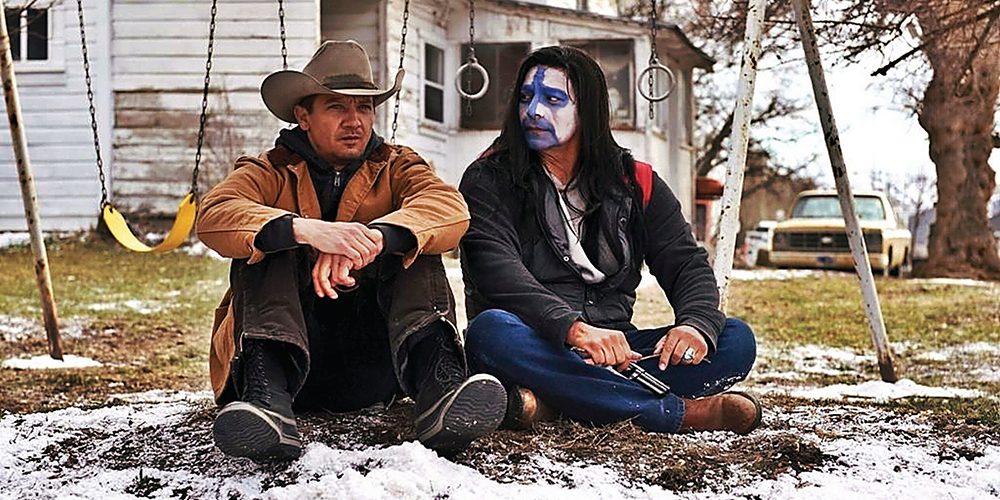This image released by The Weinstein Company shows Jeremy Renner, left, and Gil Birmingham in a scene from “Wind River.” (Fred Hayes/The Weinstein Company via AP)
“You will lose someone you can’t live without, and your heart will be badly broken, and the bad news is that you never completely get over the loss of your beloved. But this is also the good news. They live forever in your broken heart that doesn’t seal back up. And you come through. It’s like having a broken leg that never heals perfectly—that still hurts when the weather gets cold, but you learn to dance with the limp.” — Anne Lamott (Bird by Bird, Blue Shoe)
***
Wind River, writer-turned-director Taylor Sheridan’s major film debut (he directed indie horror film Vile previously), has been labeled a crime drama, a mystery, and a thriller, but it could just as easily be classified as a western—albeit one with many of the traditional tropes of the genre flipped on their head. The title is taken from the name of a small town nearby Jackson Hole, Wyoming and adjacent to a Native American reservation. And while the story is straightforward and easy to follow, it manages to be surprising in places because of its characters, framing and focus. It is also bleak and harrowing to watch, but more on that later.
Jeremy Renner gives an affecting performance as the introspective, grieving Cory Lambert, a fish and wildlife agent whose specialty is hunting predators like wolves and wild cats who prey on local farmer’s livestock. His taciturn performance might at first feel familiar as the strong, quiet cowboy type, but this is retextualized as we learn more about his character and history. Lambert struggles with the guilt and grief surrounding his daughter’s death which all comes flooding back as he discovers the dead body of a local Native American girl (Kelsey Asbille) alone in the wilderness, frozen, barefoot, and raped.
Lambert calls Ben (Graham Greene), the Tribal Police Sheriff, who in turn reaches out to the FBI who sends green agent Jane Banner (Elizabeth Olsen) from Las Vegas just because she was the closest free agent available. As the three begin to strike a professional balance, their personal lives and experiences surface as the ways they can relate to and help each other solve this brutal crime; Sheriff Ben navigates the locals as only an oft-overworked and understaffed professional law officer can, Banner, while lacking experience, proves tenacious and unrelenting in her search for justice, and Lambert puts his tracking skills and grief to good use, coaxing out clues instead of beating them out of the bad guys.
While the film is a mish-mash of genres, and is punctuated by a couple scenes of violence including a soul-sickening rape, its heart is a tale of grief and mourning. Specifically, it is a tale of male grief. While we get to witness the pain of the women in the story—including Lambert’s estranged ex-wife (Julia Jones), the dead girl’s mother who has taken to cutting herself in her grief, and even the physical trauma inflicted upon the dead girl and Banner—it is the men dealing with their pain and grief that drives the action.
We see the weathered and worn weariness of Sheriff Ben, the anger and turn to substance abuse in response to a painful world by the dead girl’s brother, the loneliness and violence from a group of men trapped in the cold wilderness for too long, despair and heartbreak couched in sarcasm and cynicism from the girl’s father, Martin (Gil Birmingham in a scene-stealing supporting role), until he encounters Lambert and breaks down in tears, and of course Lambert himself who having been through a similar loss gives Martin a speech not unlike the words from Anne Lamott above. Lambert also notes at one point that instead of fighting the world, he has chosen to fight the suffering within himself because he notes, “the world would win.”
At Vox, film critic Alissa Wilkinson laments, “Unlike Hell or High Water [which Taylor Sheridan wrote], which had its moments of gallows humor, Wind River is deadly serious at all times, with no space for any human connection other than the saddest kind. And while there’s no reason to crack a lot of jokes to lighten the mood, it can start to feel like the movie relies too heavily on despair, to the point of capitalizing on its characters’ suffering—and, given the realism of Sheridan’s films, the suffering of people like them.” While there are actually a few moments of dry humor shared between Lambert and his ex-father-in-law and with Sheriff Ben, I think the unrelenting heaviness of the film is a feature, rather than a bug. The film is a study in the ways of grief and while we often want our entertainment to be light and happy, or even just provide us a glimmer of hope, I believe there is a place for such stories as Wind River, which force us to sit in the grief and push through instead of finding an escape.
Indeed, there is another more metaphorical reading of Wind River, which is not so subtly hinted at a few times, that likens Western, “civilized,” white culture as rapists and murderers of the Native Indian population and the land they inhabited for so long before being relocated to the reservations they now find themselves in. And there are audiences that will find that distasteful and want to escape its implications, but Wind River isn’t interested in indulging that escape—at least not through lightening the proceedings through humor. Even the gorgeous, but stark cinematography by Ben Richardson and the soundtrack by Nick Cave (who tragically lost a child himself recently) and Warren Ellis provide no comfort or release.
Maybe this is just the type of film, the type of story, we ought to engage with more in order to face our own personal and cultural grief—to learn how to push through and maybe one day dance again, even if it is with a limp.








